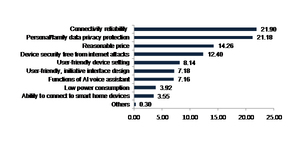Taipei-based government-backed research institute MIC (Market Intelligence& Consulting Institute) of III (Institute for Information Industry) conducted a questionnaire-based survey on Taiwanese consumers in May 2019 to ascertain their views about AI voice assistants.
 |
| /news/2019/07/24/2035473470S.jpg |
“The findings suggest the top three major determining factors influencing Taiwanese consumers’ willingness to buy their AI voice assistant are: Connectivity reliability, personal privacy protection, and reasonable prices,” said Claire Lin, senior industry analyst at MIC. “The findings also suggest Taiwanese consumers tend to value privacy protection over reasonable prices. Therefore, when AI voice assistant vendors develop new products in the future, they should draw attention to privacy protection design,” Lin added.
Which of the following factor(s) do you consider when buying your AI voice assistant which are to be built into smart devices at home? (Please rank in order of importance with 1 being the most important factor and 5 being the least important factor)
"In the face of the unstable internet environment, AI voice assistant brands such as Google and Amazon have started to develop on-device or so-called decentralized voice assistants in the second half of 2018 that can run basic voice assistant functions offline. Essentially one-device voice assistants need higher computing efficiency and larger memory space and it takes time. Once that happens, a variety of needs for AI on chips and components will likely to bring these AI voice assistant vendors’new opportunities.”

